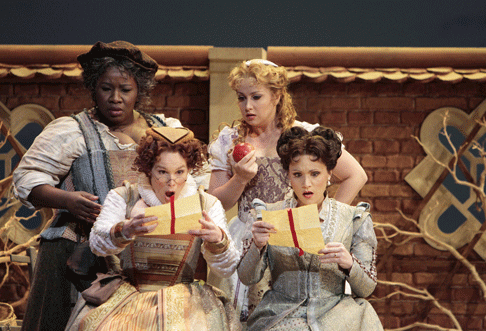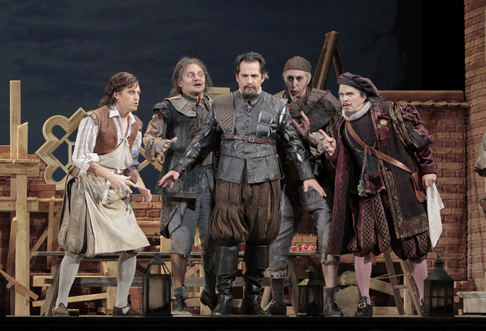Verdi, who composed more than twenty operatic tragedies and was a life long
student of Shakespeare’s plays (witness his powerful Macbeth and heart
wrenching Otello) had previously written only one comedy, Il
Giorno di Regno (King for a Day). He wrote it when he was 27, at the very
outset of his career, but sadly, immediately after the death of his young wife
and infant children, and the work failed. Fifty years passed before he
undertook this second comedy. He was 80 when Falstaff opened on
February 9th 1893 at La Scala in Milan.
Shakespeare’s fictional Sir John Falstaff, a man bloated in body and spirit,
and now immortal, is one of literature’s most renowned comic inventions. He
appears in three of Shakespeare’s plays — first, in the histories; Henry
IV, part 1 and Henry IV part 2, and later, in the comic Merry
Wives of Windsor, which is devoted to his exploits alone. In the Henry
plays Falstaff is deceitful, funny, and very smart. As the central character of
The Merry Wives of Windsor, he is deceitful, absurd, and the butt of
ridicule. The eminent 18th century scholar, Samuel Johnson found
“nothing in [Falstaff] that can be esteemed.”. The eminent modern scholar
Harold Bloom, considers the early Falstaff one of Shakespeare’s most
intelligent characters.
 Left to right: Ronnita Nicole Miller as Mistress Quickly, Erica Brookhyser as Meg Page; Ekaterina Sadovnikova as Nannetta; Carmen Giannattasio as Alice Ford.
Left to right: Ronnita Nicole Miller as Mistress Quickly, Erica Brookhyser as Meg Page; Ekaterina Sadovnikova as Nannetta; Carmen Giannattasio as Alice Ford.
Composers Antonio Salieri, Michael Balfe and Otto Nicolai, based operatic
works on the comically absurd Falstaff of the Merry Wives . British
composers, Sir Edward Elgar, Gustav Holst, and Vaughan Williams emphasized the
historical British past in their telling of the fat knight’s adventures.
Williams’ score contains British folks songs including “Greensleeves.”
Verdi and Boito created a perfectly blended masterpiece — a comic opera set
in oak timbered England, that sounds and plays like a manic French farce.
The story: Falstaff sets out to woo two wealthy women — his motives are
simple: lust and financial gain. Sad for him, it turns out the women know each
other and set out to trick him. They set a trap and succeed in making a fool of
him. In fact, they succeed more than once — which should tell you something
about Falstaff’s personality. However, there is a happy ending, and the
would-be seducer is invited to a feast with the women and their families,
including the husband he intended to cuckold.
Falstaff requires an extraordinary cast. Verdi had written a new
and different kind of opera, an opera whose music is a perpetual motion of
merry deceits. In planning its premiere he turned down singers, even renowned
singers, “who express feeling and action by falling asleep on the notes.”
This new opera had to be performed by artists who "articulate" and “sing with
brio.”
Los Angeles Opera gets high marks for presenting an excellent cast. Baritone
Roberto Frontali, properly plumped up as Falstaff, sang with attention to the
lyric, as well as humorous aspects of the Falstaff’s music, and with clear
articulation. Baritone Marco Caria, who was debuting with the company as the
Ford, delivered a passionate rendition of the humorous monologue on women.
Robert Brubaker was properly humorous in the thankless tenor role of Dr Caius.
Argentine tenor, Juan Francisco Gatell, was a handsome, lithe, but light voiced
Fenton in his company debut. Bardolph (Rodell Rosel) and Pistol (Valentin
Anikin) were amusingly deceitful rogues.
 Left to right: Juan Francisco Gatell as Fenton, Rodell Rosel as Bardolph, Marco Caria as Ford, Valentin Anikin as Pistol and Robert Brubaker as Dr. Caius
Left to right: Juan Francisco Gatell as Fenton, Rodell Rosel as Bardolph, Marco Caria as Ford, Valentin Anikin as Pistol and Robert Brubaker as Dr. Caius
Soprano Carmen Giannattasio and mezzo-soprano Erica Brookhyser, as Alice and
Meg respectively, were charming schemers. Ekaterina Sadovnikova, a pert
soprano, made the snatches of Nannetta’s love music, and her “Sul fil d’un
soffio etesio” gleam. Ronnita Nicole Miller was properly conspiratorial and
panderous as Mistress Quickly. However her mezzo soprano voice lacked the
darkness “to function” as Verdi intended, “as the double bass in the
women’s quartets”. And speaking of quartets, the extremely difficult ensemble
pieces in this opera — the male and female octet and the last glorious fugue,
incorporating the entire cast and chorus, were sharp, crisp and joyous.
For this production the opera company engaged British director, Lee Blakely
and designer, Adrian Linford. Before the performance began and as scene changes
were required, a drop down curtain containing various Shakespearean excerpts
referring to Falstaff were a thoughtful touch, which added a sense depth, and I
think helped keep audience anchored to the background of the tale. The settings
were traditionally, but skimpily, Elizabethan. I found the trap door entrance
and exit in the floor of Falstaff’s first act quarters, perhaps to offer the
gratuitous information that the impoverished rogue was living an attic,
unnecessary and distracting. Clearly, Falstaff couldn’t get through that door.
Unfortunately the setting and direction of the last act, the dramatic and
musical climax of the opera did not match the magic of its music. The music and
libretto call for a sort of midsummer night’s fairy land setting. Shakespeare’s
text calls on “fairies”and “elves” to pinch, tease and shake the
villainous Falstaff. The words are even more amusing in Boito’s Italian,
“pizzica, pizzica, stuzzica, spizzica, spizzica.” Unfortunately, the stage
was shallow and essentially bare except for the required oak tree. Falstaff ’s
punishment, set front and center on the foreshortened stage with the chorus
lined up behind him, and with only a few “un-elfish” and “un-fairy”
like creatures “attacking” him, was heavy handed and unconvincing.
Ah, but under James Conlon’s baton, the conducting of the act, in fact, of
the entire opera was all “pizzica, stuzzica,” touch and go, light, airy,
bouncy and merry as it should be.
Estelle Gilson
Cast and production information:
Dr. Caius: Robert Brubaker; Sir John Falstaff: Roberto Frontali;
Bardolph: Rodell Rosel; Pistol: Valentin Anikin; Meg Page: Erica Brookhyser;
Alice Ford: Carmen Giannattasio; Mistressuickly: Ronnita Nicole Miller;
Nannetta: Ekaterina Sadovnikova; Fenton: Juan Francisco Gatell; Ford: Marco
Caria. Conductor: James Conlon. Director: Lee Blakeley. Scenic and Costume
Designer: Adrian Linford. Lighting Designer: Rick Fisher. Chorus Master: Grant
Gershon.
![Carmen Giannattasio as Alice Ford and Roberto Frontali as Falstaff. [Photo by Robert Millard]](http://www.operatoday.com/FLS5200.gif)

